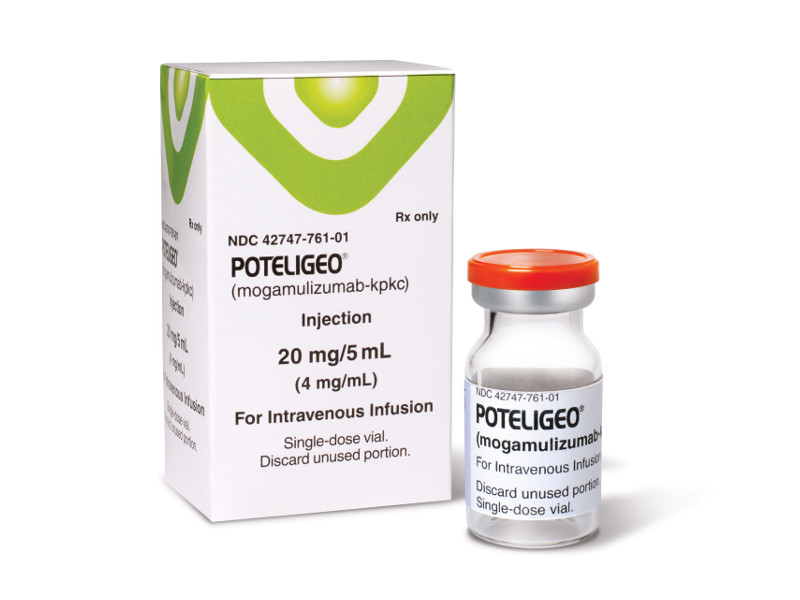Adcetris (brentuximab vedotin) vs Poteligeo (mogamulizumab)
Adcetris (brentuximab vedotin) vs Poteligeo (mogamulizumab)
Adcetris (brentuximab vedotin) is an antibody-drug conjugate specifically targeting CD30-positive cells, commonly used in the treatment of Hodgkin lymphoma and systemic anaplastic large cell lymphoma. Poteligeo (mogamulizumab) is a monoclonal antibody that targets CCR4, used for the treatment of mycosis fungoides and Sézary syndrome, which are types of cutaneous T-cell lymphoma. When deciding between the two, it is crucial to consider the specific type of lymphoma being treated, as the effectiveness of each medication is dependent on the presence of their respective targets, CD30 or CCR4, on the cancer cells.
Difference between Adcetris and Poteligeo
| Metric | Adcetris (brentuximab vedotin) | Poteligeo (mogamulizumab) |
|---|---|---|
| Generic name | Brentuximab vedotin | Mogamulizumab |
| Indications | Hodgkin lymphoma, systemic anaplastic large cell lymphoma, primary cutaneous anaplastic large cell lymphoma, and certain types of mycosis fungoides | Relapsed or refractory mycosis fungoides or Sézary syndrome |
| Mechanism of action | CD30-directed antibody-drug conjugate | CCR4-directed monoclonal antibody |
| Brand names | Adcetris | Poteligeo |
| Administrative route | Intravenous infusion | Intravenous infusion |
| Side effects | Fatigue, nausea, diarrhea, fever, cough, neutropenia, etc. | Infusion reactions, skin rash, fatigue, diarrhea, musculoskeletal pain, etc. |
| Contraindications | Hypersensitivity to brentuximab vedotin or any of its excipients | Hypersensitivity to mogamulizumab or any component of the formulation |
| Drug class | Antineoplastic agent, monoclonal antibody | Monoclonal antibody, immunomodulator |
| Manufacturer | Seattle Genetics | Kyowa Kirin |
Efficacy
Efficacy of Adcetris (Brentuximab Vedotin) in Lymphoma
Adcetris (brentuximab vedotin) is an antibody-drug conjugate specifically indicated for the treatment of several types of lymphoma. It is approved for use in patients with classical Hodgkin lymphoma (HL) after failure of other treatments, such as autologous hematopoietic stem cell transplantation (HSCT) or at least two prior multi-agent chemotherapy regimens in patients who are not auto-HSCT candidates. In clinical trials, Adcetris has shown significant efficacy in inducing remission in patients with relapsed or refractory HL. Additionally, it is also approved for the treatment of systemic anaplastic large cell lymphoma (sALCL) and primary cutaneous anaplastic large cell lymphoma (pcALCL) and mycosis fungoides (MF) who have received prior systemic therapy.
The efficacy of Adcetris was demonstrated in pivotal clinical trials, such as the AETHERA trial, which showed a significant improvement in progression-free survival (PFS) compared to placebo in patients with HL at high risk of relapse or progression post-autologous HSCT. In patients with sALCL, studies have shown that Adcetris can induce complete remission in a substantial proportion of patients, with some patients achieving durable responses.
Efficacy of Poteligeo (Mogamulizumab) in Lymphoma
Poteligeo (mogamulizumab) is a monoclonal antibody that targets CC chemokine receptor 4 (CCR4) and is used for the treatment of certain types of lymphoma. It is specifically indicated for adult patients with relapsed or refractory mycosis fungoides (MF) or Sézary syndrome (SS), which are subtypes of cutaneous T-cell lymphoma (CTCL). The approval of Poteligeo was based on the results of the MAVORIC trial, which was the largest randomized study conducted in patients with MF and SS. This trial demonstrated that mogamulizumab significantly improved progression-free survival compared to vorinostat in patients with MF and SS.
The efficacy of Poteligeo in treating CTCL is attributed to its mechanism of action, which involves binding to CCR4 expressed on the surface of cancer cells, leading to their destruction. Clinical trials have shown that mogamulizumab can lead to a higher rate of response and longer duration of response compared to other therapies. This efficacy has been observed even in patients who have previously received multiple lines of therapy, indicating its potential as a valuable treatment option for patients with advanced stages of CTCL.
Regulatory Agency Approvals
Adcetris
-
European Medical Agency (EMA), European Union

-
Food and Drug Administration (FDA), USA

-
Health Canada

-
Pharmaceuticals and Medical Devices Agency (PMDA), Japan

-
Therapeutic Goods Administration (TGA), Australia

-
NMPA (China)

Poteligeo
-
European Medical Agency (EMA), European Union

-
Food and Drug Administration (FDA), USA

-
Therapeutic Goods Administration (TGA), Australia

Access Adcetris or Poteligeo today
If Adcetris or Poteligeo are not approved or available in your country (e.g. due to supply issues), you can access them via Everyone.org.
How it works

Make an enquiry
Choose the medicine you want to buy, answer a couple of questions, and upload your prescription to speed things up. We’ll get back to you within 24 hours.


Make an enquiry
Choose the medicine you want to buy, answer a couple of questions, and upload your prescription to speed things up. We’ll get back to you within 24 hours.


Breeze through the paperwork
We'll guide you through the required documents for importing unapproved medicine, ensuring you have all the necessary information.


Get a personalized quote
We’ll prepare a quote for you, including medicine costs and any shipping, administrative, or import fees that may apply.


Receive your medicine
Accept the quote and we’ll handle the rest - sourcing and safely delivering your medicine.

Some text on this page has been automatically generated. Speak to your physician before you start a new treatment or medication.
Let's talk
If you have any questions, call us or send us a message through WhatsApp or email:
Contact us




